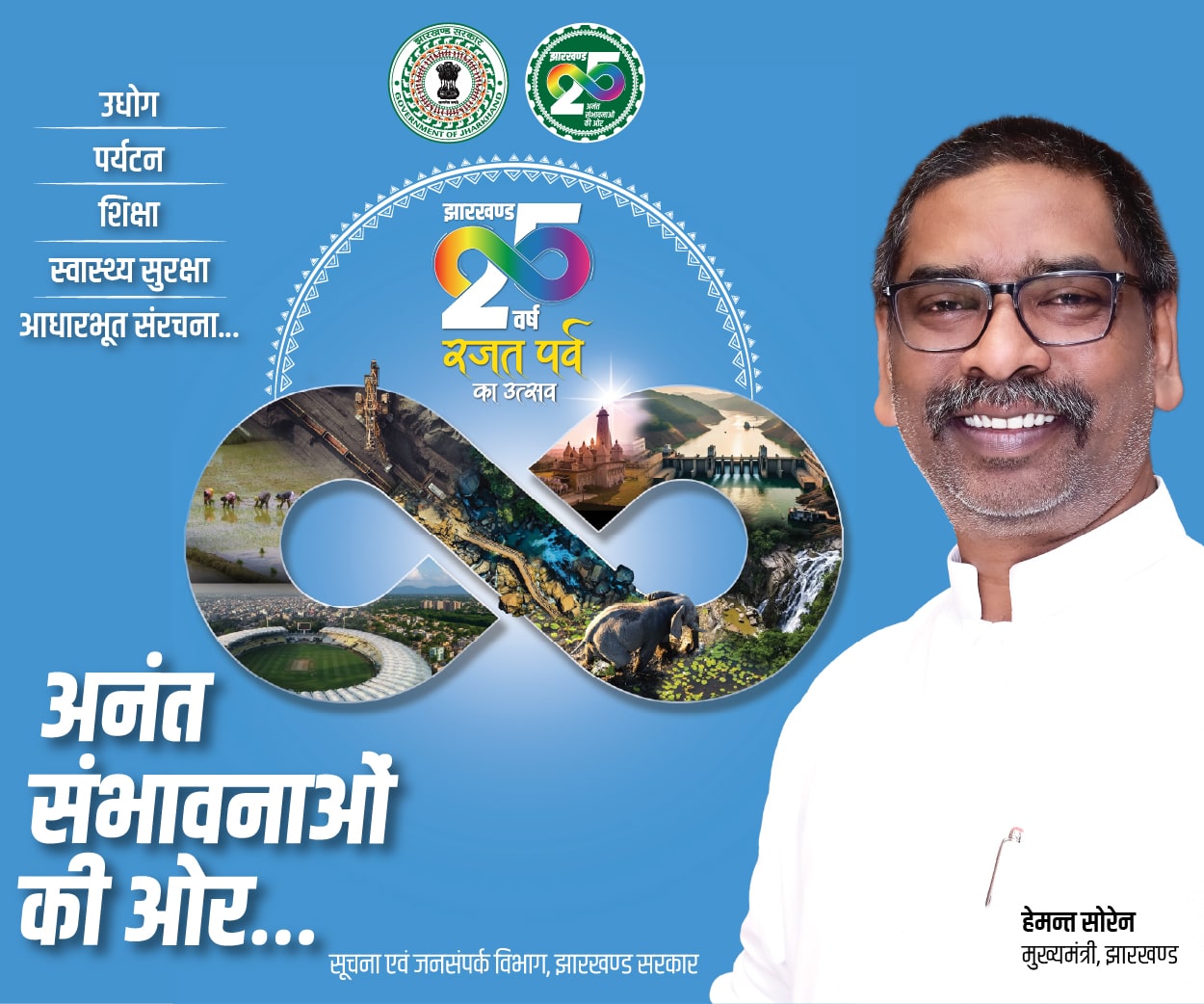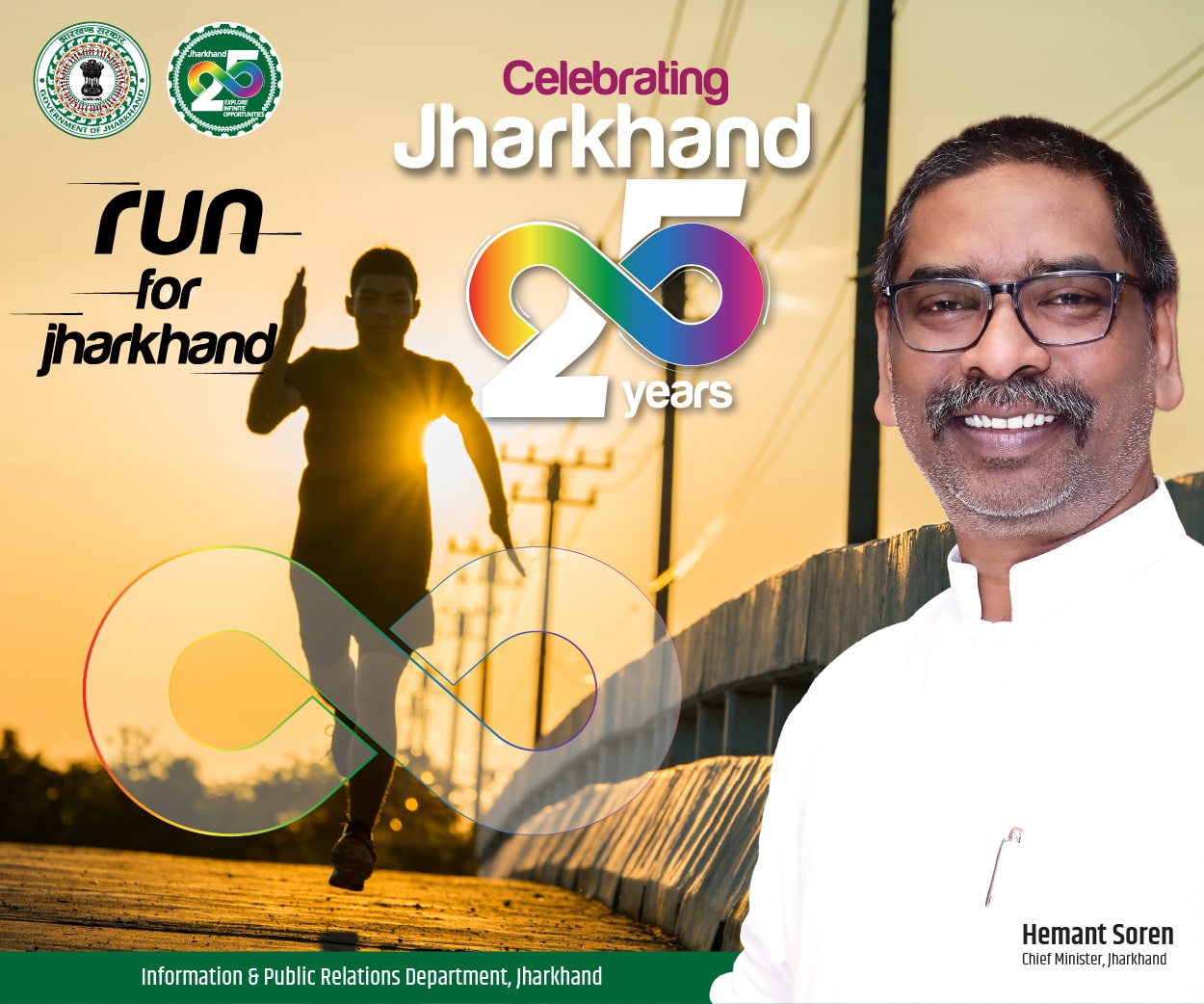



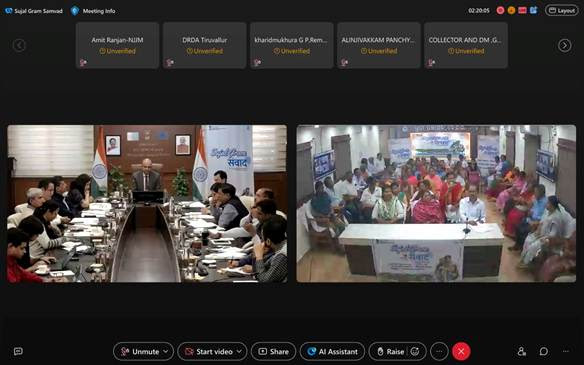
*Live interaction in Odia language between Secretary DDWS and representatives of Belagam Village, District - Ganjam, Odisha
Going forward, the Sujal Gram Samvad will be held periodically, enabling continuous, structured, and inclusive dialogue between villages, districts, States, and DDWS. These efforts will continue with other states as well.
Incidentally, though not one from Jharkhand participated in the Sujan Gram Samvad,the latest event recorded the change taking shape in rural belt of India.
In fact, the inaugural Sujal Gram Samvad, organised by the Department of Drinking Water & Sanitation (DDWS), Ministry of Jal Shakti Tuesday, emerged as a national platform where villagers from across 12 States/UTs narrated – in their own regional languages – their stories of struggle, determination, and transformation under Jal Jeevan Mission (JJM).
Village representatives described how access to safe tap water has improved health, reduced water-borne diseases, enabled girls to attend school regularly, freed women from hours of water collection, and strengthened livelihood opportunities. Communities narrated how they came together to repair motors and pipelines, ensure uninterrupted supply, conduct water quality testing, promote water conservation, support user-charge collection, and establish grievance redressal systems.
These stories – shared with honesty and emotion in Odia, Tamil, Hindi, Gujarati, Marathi, Punjabi, Mizo, Rajasthani, Manipuri, Telugu, Maghi and Bundelkhandi languages, were heard across the country by over 1,500 participants. More than 800 people joined in interactive mode, while an equal number connected via YouTube, making the Samvad a truly national listening platform.
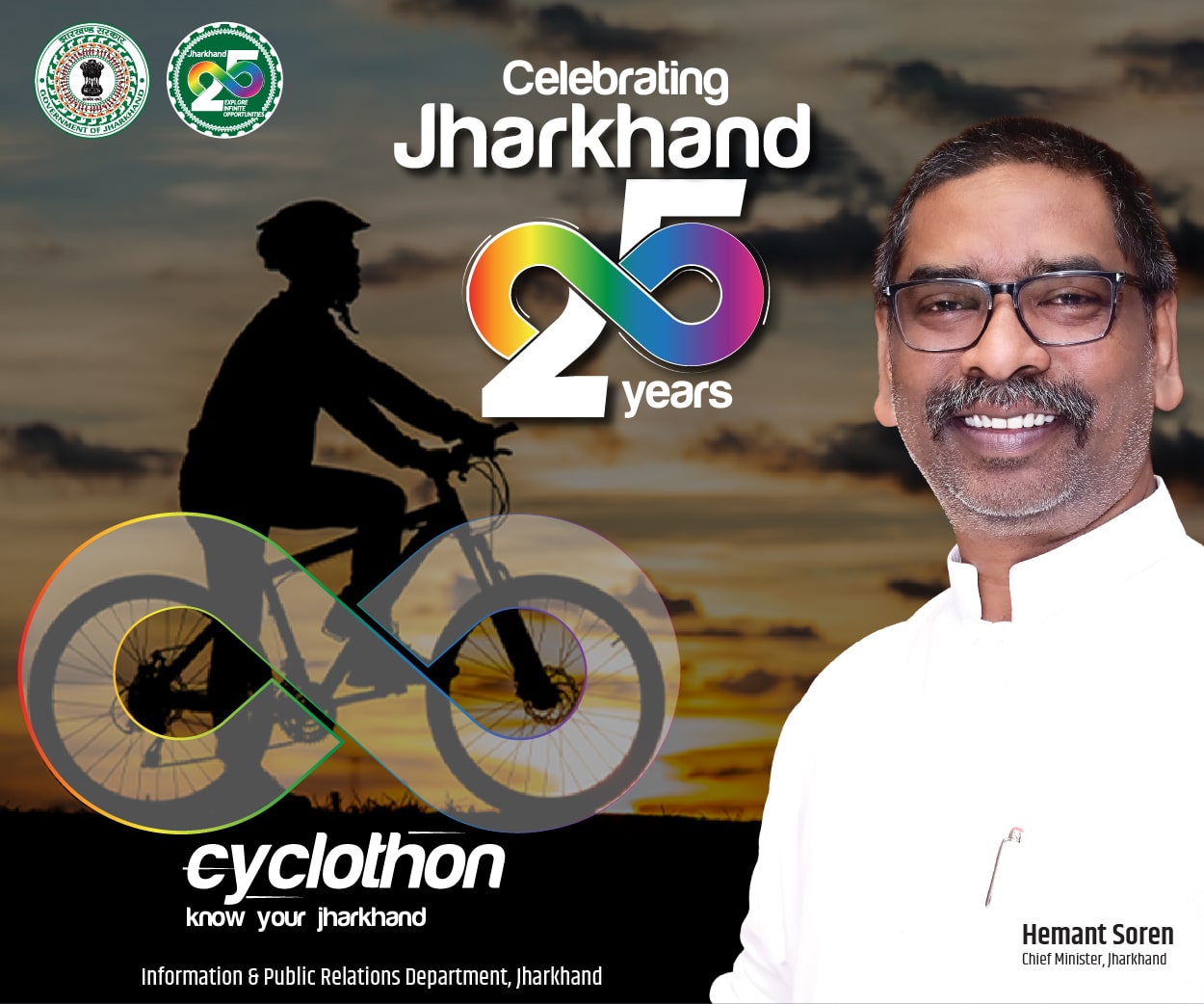
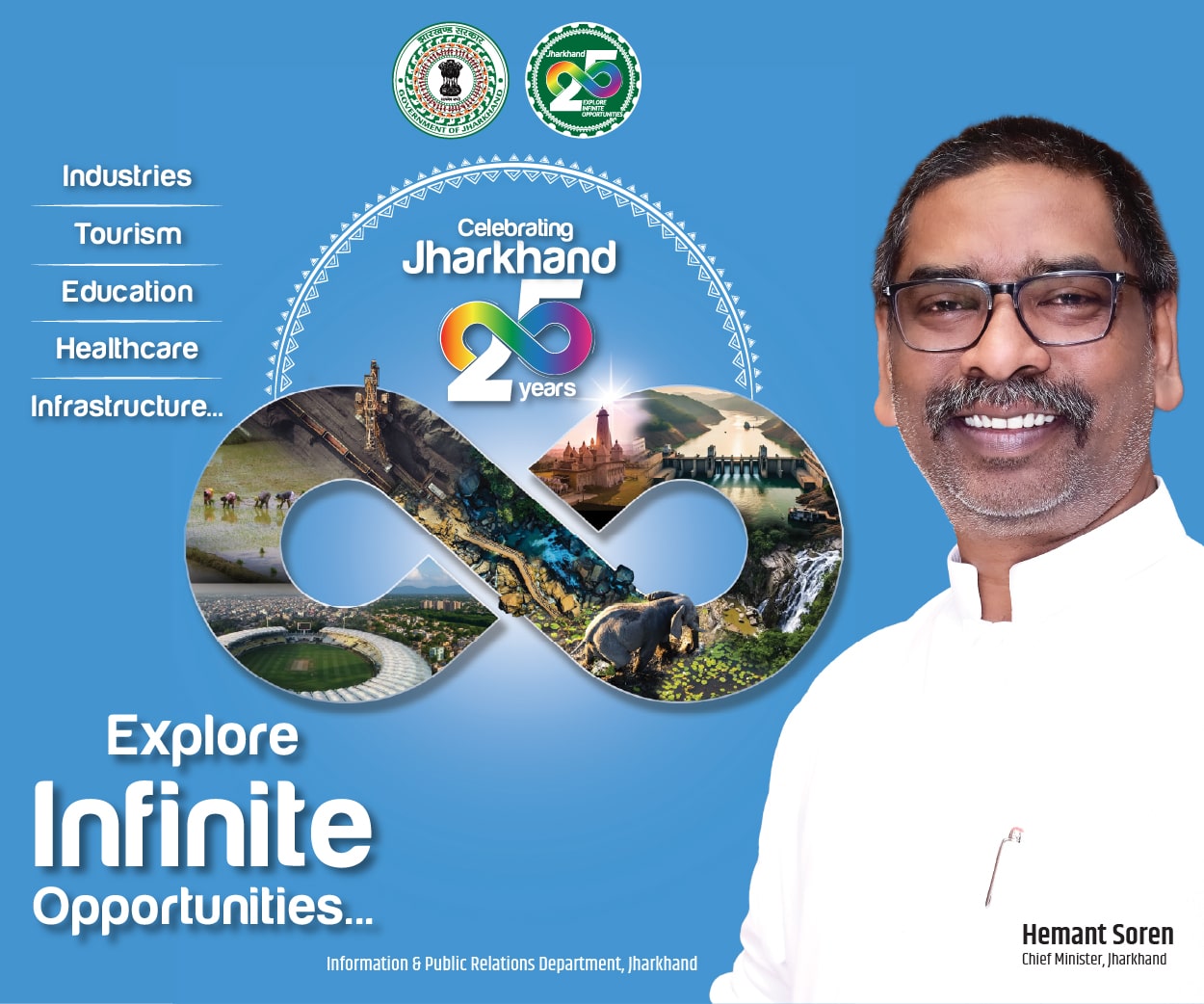
Stories From the Villages: Voices of Transformation
Odisha – Belagam Village, District - Ganjam
The Samvad opened with Belagam village, where villagers explained how user-fee collection, water quality testing, and community-level monitoring have strengthened daily water supply. The Secretary, DDWS interacted with them in Odia, appreciating their community leadership and women’s involvement.
Madhya Pradesh – Beohari Village, District - Seoni
Villagers from Beohari village shared how they work collectively to keep motors functional, repair pipelines quickly, address electricity issues, and run awareness drives for saving water and preventing leakages. They spoke of healthier children and reduced drudgery for women.
Rajasthan – Nirjharana Village, District - Dausa
Representatives from Nirjharana village narrated in Rajasthani, how JJM has changed their daily lives – bringing dignity, certainty, and better health. Smt. Swati Meena Naik, Joint Secretary, NJJM, interacted with them in the local language, appreciating their traditional practices, water conservation measures, and community-led management of the water supply system.
Tamil Nadu – Alinjivakkam Village, District – Tiruvallur
Villagers from Alinjivakkam spoke about how regular tap water supply has improved family health and reduced the need for women to walk long distances. The VWSC here works closely with the Anganwadi Centres (AWC) and ASHA workers to mobilise communities, promote safe water practices, and strengthen participation in the village water supply system.
Maharashtra – Sarola Village, District – Pune
Sarola villagers shared how tap connections have improved health, sanitation, and household routines. Women spoke of the time saved due to doorstep water availability and how this has opened opportunities for income generation and self-help group activities. They also spoke about water quality monitoring on a regular basis.
Mizoram – Khawruhliian Village, District – Aizwal
Interacting in Mizo, the villagers of Khawruhliianexplained how their GP ensures O&M of water supply schemes despite terrain challenges. They highlighted their practices for spring protection, pipeline repairs, and community monitoring to ensure uninterrupted service.
Punjab – Parcha Village, District – Gurdaspur
Speaking in Punjabi, villagers from Parcha shared how consistent tap water supply has eased daily life and reduced the stress on women. They spoke about their regular water quality checks, plantation drives near water sources, and the strong role of women’s groups in managing daily operations.
Gujarat – Takhatgadh Village, District – Sabarkantha
Villagers shared that their user-charge collection system is firmly in place. The state team highlighted how PACS (Primary Agricultural Credit Societies) are supporting the Gram Panchayat in managing and strengthening the village water supply system.
Manipur – Lairenjam Village, District – Imphal West
Speaking in Manipuri, representatives of Lairenjamvillage discussed how JJM has improved health, reduced drudgery, and provided dignity to women. They explained their practices in monitoring water quality, repairing pipelines, and mobilising community members.
Bihar – Kachariyadih Village, District – Nawada
Representatives from Kachariyadih described how access to safe tap water has significantly reduced water-borne illnesses and improved the lives of children and mothers. They shared how their community works through the Panchayat to maintain water sources and promote water quality awareness.
Andhra Pradesh – Enamadala Village, District – Eluru
Representatives from Enamadala village explained how the village regularly monitors water quality and conducts systematic testing through their well-equipped laboratory. They shared that prompt action is taken whenever leakages or supply-related issues arise, ensuring that households receive safe and uninterrupted drinking water.
Uttar Pradesh – Banka Pahari Village, District – Jhansi
The villagers describing their journey from water scarcity to reliable tap connections, spoke about the network of Jal Sahelis, who have been instrumental in mobilising the community, promoting water conservation, and monitoring supply systems.
Across all 12 States/UTs, villagers broadly described how they monitor water quality, manage local assets, conserve water, plant trees, improve source protection, and maintain grievance redressal systems, demonstrating strong ownership at the grassroots.

DDWS team in discussion with representatives from Khawruhliian village, District - Aizwal, Mizoram in Mizo language

Shri KVS Choudhary, MD – Madhya Pradesh Jal Nigam attending the Sujal Gram Samvad session through VC
District administrations and the State Water and Sanitation Missions are playing a critical role in supporting villages and communities to strengthen and expand their efforts. From guiding villages in source sustainability and O&M planning to enabling convergence with MGNREGA, facilitating water quality testing, and helping communities adopt good practices, the districts and States are ensuring that the progress achieved under JJM is sustained and taken to the next level.
State-Wise Participation From GP Headquartering Villages
The following villages participated through structured 15-minute regional-language segments:
Odisha (Odia): Belagam, District - Ganjam
Madhya Pradesh (Hindi): Beohari, District - Seoni
Manipur (Meitei/Manipuri): Lairenjam, District - Imphal West
Rajasthan (Rajasthani/Marwari): Nirjharana, District - Dausa
Tamil Nadu (Tamil): Alinjivakkam, District - Tiruvallur
Andhra Pradesh (Telugu): Enamadala, District - Eluru
Punjab (Punjabi): Parcha, District - Gurdaspur
Gujarat (Gujarati): Takhatgadh, District - Sabarkantha
Maharashtra (Marathi): Sarola, District - Pune
Mizoram (Thadou/Mizo): Khawruhliian, District - Aizwal
Bihar (Bhojpuri/Maithili/Magahi): Kachariyadih, District - Nawada
Uttar Pradesh (Hindi/Bundelkhandi): Banka Pahari, District - Jhansi
A Platform for Shared Learning Across Governance Levels
One of the key objectives of the Sujal Gram Samvad was to ensure that the learnings and good practices shared by villages are taken forward by district administrations and State Missions. The dialogue with DCs/DMs and State Mission Directors helped ensure that these successful local efforts can be adopted, strengthened, and expanded at the district and State levels.
In his inaugural speech, Secretary, DDWS stated: “The framework of Sujal Gram Samvad has been designed to listen to Gram Panchayats, understand their challenges, learn from their good practices, and recognise their leadership on the ground.”
Following each village’s presentation, the Additional Secretary & Mission Director (AS&MD), NJJM, interacted with the village team, the District Collector/District Magistrate, and the State MD. He emphasised on Operation & maintenance of rural water supply systems; Convergence with MGNREGA; Source sustainability & water conservation; Regulated and equitable water supply; Water quality testing and monitoring; Grievance redress mechanisms; Panchayat dashboard utilisation; User-charge collection; Commissioning and handover protocols
In his closing remarks, the AS&MD highlighted three critical action points:
The Samvad was chaired by Secretary, DDWS, Shri Ashok K.K. Meena and attended by AS&MD, NJJM, Shri Kamal Kishore Soan; JS-NJJM, Smt. Swati Meena Naik; senior DDWS officers; and District Collectors/District Magistrates, State MDs, members from SWSM and DWSM from all States/UTs, along with village representatives from all State/UTs.
Regional-Language Dialogue Strengthens Trust
The multilingual format of the Sujal Gram Samvad allowed communities to share openly in their own languages, creating comfort, trust, and authenticity. It deepened the connection between communities and institutions and helped the officials gain direct insight into the ground reality.
Going forward, the Sujal Gram Samvad will be held periodically, enabling continuous, structured, and inclusive dialogue between villages, districts, States, and DDWS. These efforts will continue with other states as well.
